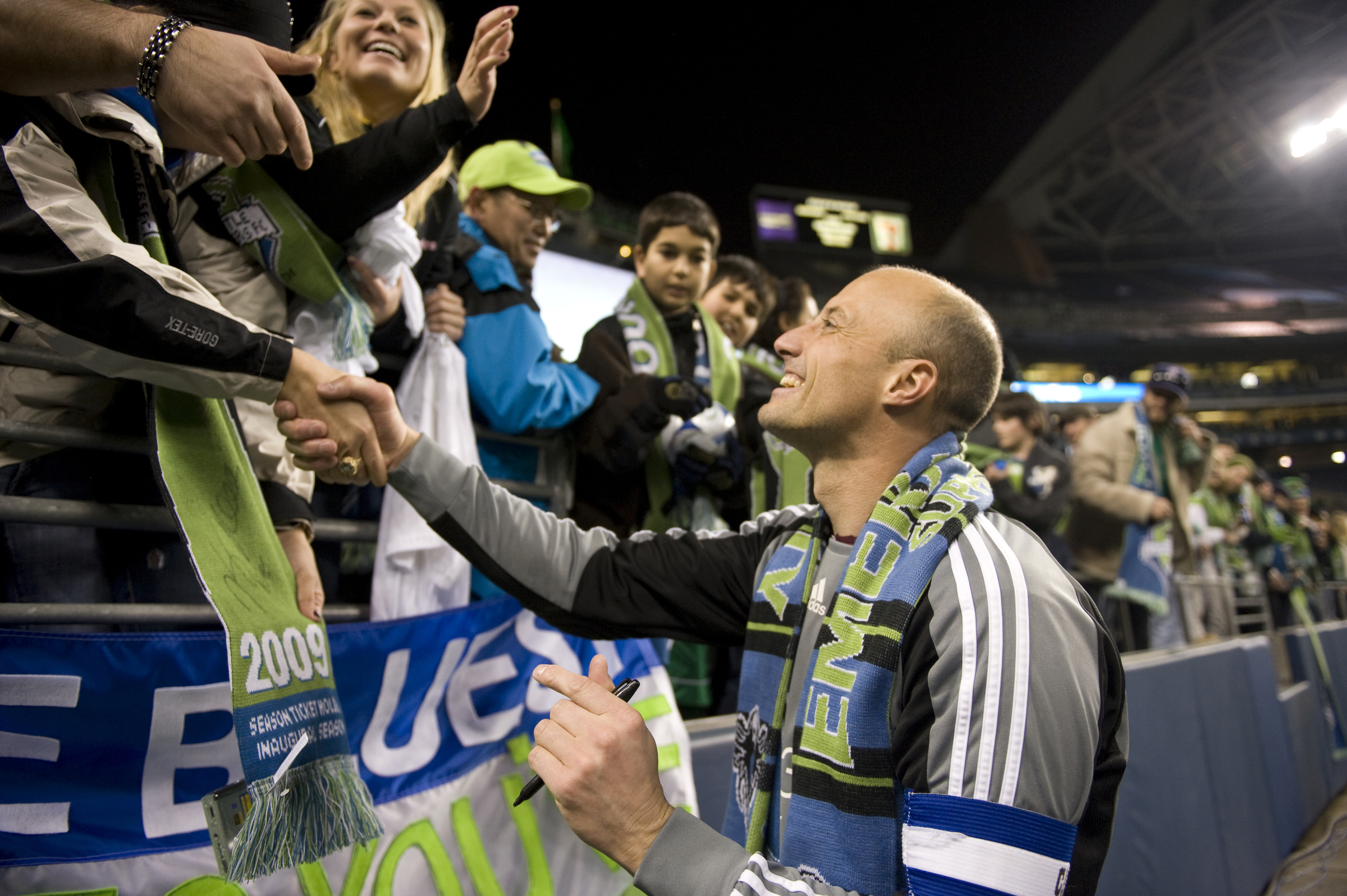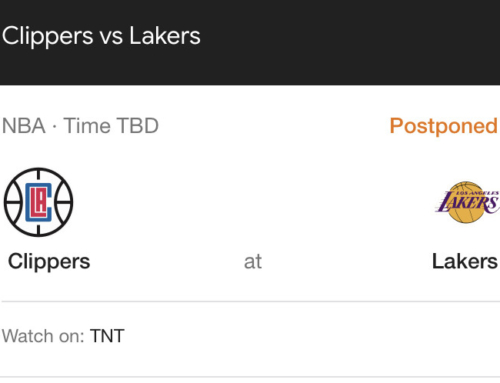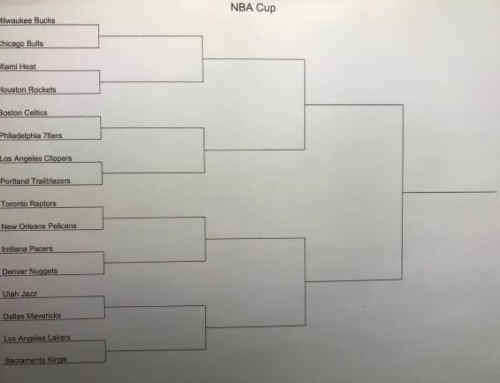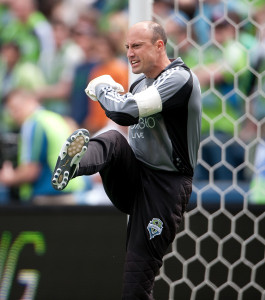
(photo: Rod Mar)
Lacey, Washington native Kasey Keller was elected to the National Soccer Hall of Fame today on the first ballot. The best player ever produced by the Evergreen State and one of the best Americans of all time, Keller spent the majority of his pro career playing in Europe. As his career wound down, he liked the idea of ending it in Seattle, but the Sounders as an MLS entity didn’t yet exist. But after a coincidence involving one of his best friends and a fortuitous meeting with then Seahawks coach Mike Holmgren, Keller ended up coming home to finish up his career with what would be three memorable years with Sounders FC. From the book “Sounders FC: Authentic Masterpiece”, here’s the story of Keller’s journey home.
CHAPTER 9
Summer 2007 Tonisvorst, Germany
“He was so good people forgot pretty quickly that he was American.”
Kasey Keller and his wife Kristin stood in the middle of their castle in Tonisvorst, Germany, and took inventory. After 15 years living in England, Spain, and Germany they were facing a crucial transition in their lives, and they were just starting to come to grips with it.
Kasey Keller’s soccer career was over.
Keller had played the game since he was a kid and had played it well at the highest levels. He was recognized as one of the greatest American players ever, with 110 appearances on the US Men’s National Team. Three times he was named US Soccer athlete of the year, and twice he was named the Honda Player of the Year as the best player on the USMNT.
He had played 364 games in the English Premier League, 61 in Spain’s “La Liga,” and another 78 in Germany’s “Bundesliga.” In all three of those leagues he had been a trailblazer of sorts, the first American born-goalkeeper to earn a starting job.
During their stay in Germany, Kasey and Kristin made their home in an 800-year-old castle named “Haus Donk” which had been designated a historical monument by the German government. The dwelling included four floors, tight spiral staircases up to bedrooms, and an indoor pool in the basement. Keller once gave a humorous video tour of his castle/home to the US Men’s National Team website. In the video he discusses one of the conditions of his staying there. If he noticed any muskrats swimming in the moat that surrounded the structure he was to immediately contact a man called ‘the Jagermeister’ (German for hunting master) who would come and exterminate the rodent. There was a muskrat farm near the castle and as long as the critters were contained they caused no worries. But if they got out of their farm they could potentially do harm to the region’s ecosystem. “Vie must kill ze vermin,” Keller says he was told by “the Jagermeister.”
It was in Haus Donk they now stood, facing the somewhat monumental task of packing up and bidding “abschied” to Germany and Kasey’s career.
The 2006-07 German season had ended in disappointment for Keller’s club Borussia Monchengladbach in May. They had been relegated to a lower division following a loss on the final day of the season. Keller’s contract with the team was up and he spent much of the summer of 2007 contemplating his future.
“I had plenty of offers, just nothing that I wanted to do,” he says. “By now I’m 37, the kids are in school, and teams are looking at you as a stopgap or maybe being a backup, and I had no desire to be a backup. There were also clubs that called me (with a chance to start) but it would have involved taking a little step down and it was in places that I had no desire to move my family.”
Among the clubs Kasey met with in the summer of 2007 was a team with no name, no uniforms, no season ticket holders and no history. But it was definitely a place he and his family would enjoy moving to. While home in Seattle after the German season he had a meeting with Adrian Hanauer, where they first discussed Keller coming home to end his career with the Seattle MLS expansion team slated to begin play in March of 2009 — nearly two years after the end of his final Bundesliga season.
Keller was intrigued, but knew that for an athlete at his age to sit out for over a year was a risky, if not foolish, proposition. Maintaining his fitness, his skills, and his enthusiasm for the game would be impossible over that long a time span. So while they agreed to meet again when the team would be closer to existence, Keller left the meeting under no illusion that playing for Seattle’s expansion MLS team was going to happen.
“At this point, we’re talking a year and a half out. It was pretty abstract. The team hadn’t been named yet. We agreed to discuss it again in the summer of 2008, but I had no intention of sitting out that long and then playing for the Sounders. I couldn’t have imagined doing that. I don’t see how I can be retired for what would be a year and a half and then come back and be motivated and in any kind of shape … I didn’t want to come in and not be who people thought I was.”
In order for Keller to seriously consider a deal in Seattle he needed to find a keeper job in Europe for the upcoming 2007-08 season (which began in early August). But by mid-August nothing had materialized that suited him. The Seattle gig was simply too far off to seriously consider. So the Kellers began packing up their house, er, castle, and considered life after soccer. It was going to be good. Keller had earned big money playing in Europe. The couple had a home in Idaho. An adrenaline junkie, Keller would be free to pursue recreational sports like skiing and snowboarding — activities that time, contracts, and common sense had largely kept him from pursuing during his pro career.
Kasey and Kristin had two children (twins Cameron and Chloe) who would turn 10 at the end of August 2007. They had been troupers throughout moves from England to Spain to Germany, but another benefit of retiring would be a chance for the twins to be anchored in one place and grow up closer to their family. It would have been nice if the timing had worked out better, and he could have finished up helping bring the top level of US soccer to Seattle, but Keller isn’t someone who spends a lot of time focusing on regrets. Still, that was a potential disappointment of a magnitude that he would not fully realize until 19 months later. He knew he had lived a great life as a professional goalkeeper and he had accepted that it was coming to an end.
“We had kind of come to the conclusion that I was going to retire.”
Then Brian McBride blew out his knee.
McBride was one of several Americans who followed Keller to Europe in the early 1990s. He spent a year with a German second-division team, then came back in 1996 to join the MLS during its inaugural season and spent the next seven seasons with the Columbus Crew. For more than a decade, McBride and Keller were mainstays and roommates on the US Men’s National Team.
In 2004 Fulham bought his rights from the MLS team, and his run with that EPL club was so successful that he was eventually named captain. He became so popular with the fans that a bar inside its home ground (the delightfully named Craven Cottage) was named after him (McBride’s).
On August 18th, 2007, Fulham was playing Middlesbrough in an early season EPL match. McBride would score the Cottagers’ only goal in the 16th minute of the match. But in the act of scoring the goal, he somehow sustained a dislocated kneecap — recovery would involve surgery and several months off. Keller called McBride to offer encouragement, and as the conversation was winding down Keller made what he thought was an innocuous comment about Fulham’s goalkeeping situation, which he knew to be in shambles due to injuries.
“Why,” McBride said, pouncing on Keller’s question. “Would you come here?”
Keller told him that wasn’t exactly what he meant, but McBride was already out of the barn and down the road with the idea. He told Keller he had to go to the team’s training ground the next day and he was going to “tell them you’re available.”
“I got a phone call about 10 a.m. the next day from the goalkeeping coach who is a friend of mine. An hour later I get a call from the head coach. Then I get a call from the club secretary with an offer, and I’m on a flight the next day. I spend two days dealing with physicals. I trained Friday. And I played Saturday.”
In five days Keller had gone from accepting his retirement to starting an EPL game. He was back in business. Looking back, the suddenness of his decision makes sense.
“Fulham was in England, where I had permanent residency; I had a green card so there were no immigration issues or work permit stuff. I could come in, sign and play and that made it real easy.”
The deal had one more benefit that wasn’t lost on Keller: He now had the bridge he felt he needed to get from Europe to Seattle. “I do remember calling Adrian and telling him I’ve signed with Fulham, and this could be a better stopgap.”
KELLER NEVER wanted to be anything other than a pro athlete and as a kid he told anyone who asked that he was going to play professionally in England.
“As I look back on the pure blind arrogance of a 15-year-old kid from Olympia, Washington. Who says, ‘I’m going to go play in England,’ when no American ever had?” he laughs as if the enormity of it is still too hard to fathom. “But I was probably so stupid that I didn’t know nobody ever had.”
Youthful ignorance aside, Keller planned his journey with his typical meticulousness choosing Portland for college because Clive Charles coached the Pilots.
“The whole idea was, if I’m going to be a professional athlete in soccer I need to be in Europe. And who’s going to help me get to Europe? This guy. Simple as that. Best decision I ever made in my life.”
Charles, who died in 2003, influenced Keller’s career far beyond the pitch. He had spent the bulk of his career playing in England and recognized the ability in Keller, but also saw that the brash youngster wasn’t always sure how to carry himself both on and off the field. Charles worked to show Keller that to achieve his goals he had to be more than just talented. He had to be disciplined in every thing he did.
“I didn’t understand at first what a mentor he became,” Keller says. “Lots of people have the ability to play pro sports, but don’t know how to be a pro athlete. I could easily have been one of those kids. He taught me how to be a pro. I learned that from him.”
Keller also spent nine years attending Cliff McCrath’s summer soccer camps in the Seattle area. McCrath compiled 597 wins in a decorated coaching career primarily at Seattle Pacific University, and his reputation was such that top-notch instructors and players attended his camps. One such instructor was Paul Barron who made over 400 appearances as a goalkeeper in England in a career that spanned 20 years. Keller worked with Barron several times at McCrath’s camp and enjoyed the work so much that he stunned both Barron and McCrath one day in 1987.
McCrath had received a phone call from the national soccer team. They wanted Keller to join one of their youth teams for training camp. He told Barron, and the duo excitedly rushed to tell Keller the news. “Tell them I have three more days to train with Paul,” was Keller’s response. McCrath was floored. Here was a 17-year old trying to dictate the details of how this deal would go down.
“Kasey,” McCrath sputtered, “This is the US NATIONAL TEAM calling. You’re going to camp.” McCrath says it took Barron and him a day to “talk some sense into him” and get him packed up and off to the US team. “But that’s Kasey. He’s always had his idea of how it works and you’re not going to change that.”
By this point Keller was establishing a reputation as someone who really might have the skills to reach his stated goal. Sounders sporting director Chris Henderson played with Keller in the 1989 Youth World Cup in Saudi Arabia. Keller was 19 and Henderson 18 at the time.
“At his age, he was ahead of everyone. He didn’t drop balls, he was composed, and he had a presence in the back. He was never lacking for confidence and as a goalkeeper you need that. You need to be brave and sure of yourself. I have really good memories of playing with him.”
The two Washingtonians helped lead the US to the semifinals in the tournament, which was the farthest a US under 20 team had ever gone. Keller was awarded the Silver Ball as the tournament’s second-best player (behind Brazilian star Bismarck).
By 1992 Keller had played in the NCAA Final Four, been named the top collegiate goalkeeper in the country, and had appeared with the USMNT in the 1990 World Cup. His play earned him a three-week trial with English First Division side Millwall FC.
Millwall is located in a gritty and somewhat dodgy part of East London. Former voice of the Sounders Arlo White minces no words in describing the atmosphere Keller entered in his first English job.
“Millwall Football Club … For goodness sake, it’s like going into a war zone. Kasey was mixing with villains and undesirables … unbeknownst to him … but because he was representing the club they were wonderful to him and they accepted him and he earned his chops there.”
Keller recalls some colorful experiences during his time with the Lions.
“It’s the toughest part of London, no doubt,” Keller says. “A friend of mine ran a tire shop/garage in the area where I lived. One day he asks me into his office. He had a gunnysack rolled up on the desk. He told me to look inside and there’s a Kalashnikov inside this bag. One of the local gangsters had an old corvette and was getting something done to it and forgot he had this AK-47 in the trunk of his car. So my friend snuck it into his office.”
Keller played in a charity golf tournament and was paired with another nefarious Millwall character. The week before the tourney the guy had been the subject of a media story alleging any number of dastardly deeds. Keller remembers being told before the match “whatever you do, don’t ask him about this. And don’t ask him about that.”
But Keller’s demeanor led to a great stint as he turned his three-week trial into four years.
“I never badmouthed Millwall,” he says. They treated me and my family and friends great so I’d never talk bad about those guys.”
As for his play? “He was so good,” White says, “people forgot pretty quickly that he was American.”
Eleven years later, after stops in Spain, three clubs in England (including the Tottenham Hotspur), Keller’s season with Fulham in 2007-08 was a mixed bag. He suffered a shoulder injury and missed four months. Upon his return, there were 10 games left in the season and the Cottagers were most likely going to be relegated. But they got hot and won four of their last five matches in what is considered one of the best relegation escapes ever. In three of those four wins Keller had a clean sheet.
As the summer of 2008 approached, he suddenly found himself with more options than he had anticipated. He discussed staying at Fulham, although the club told him that at the age of 38 they saw him strictly as a backup. He had a conversation with Tottenham where he had played from 2001 to 2005.
He also had conversations about returning to Bundesliga to play for Bayern Munich. Keller says if those conversations had gotten serious, his return to Seattle would have been derailed.
“If the Bayern Munich thing had come through, then I would have never come to Seattle. They were one of the handful of clubs I would have gone to under the premise that I’d be the backup keeper.”
No offer was made, Keller believes because Jurgen Klinsmann (who had just been hired as the manager for the legendary German side) couldn’t afford politically to bring in a high-profile American.
Keller also was in discussions with Seattle about finishing his career where it began. He wrestled with conflicting emotions as he pondered moving to MLS. On the one hand the desire to bring his family home was strong. But he was irritated at what he felt was a low-ball offer well beneath what he considered his market value.
His career resume dictated he should be paid top dollar, but MLS at the time allowed each team only one highly paid “designated player.” Keller knew the Sounders were pursuing other high-profile players with that slot while hoping to sell him on a ‘hometown-discount’ deal which meant he probably wasn’t going to get the money he desired.
“We absolutely wanted to get Kasey, but that was sort of the first deal that I was negotiating in the big leagues,” Hanauer says. “We had a bit of a duel in terms of negotiating a deal. We knew Kasey was worthy of coming over as a designated player, but we weren’t prepared to do that.”
The club wanted Keller, but it also wanted a big-name field player in his prime, and the only way they could get both was if Keller would sign for less.
In addition to the money, Keller also was apprehensive about the entire MLS vibe. He’d heard stories from other players who had left European leagues to return home and had been shocked in how far the step down could be in terms of how they were treated. Keller had played in the biggest leagues in the world, and he says too often the stories he heard about MLS from friends could be summed up thusly: “Straight-up bush league.”
That’s what Keller was thinking on May 31st of 2008. His season with Fulham had concluded a few weeks earlier and he was on vacation with his family in Greece when the Sounders contacted him and asked him to come to Seattle to attend an international friendly between Brazil and Canada. The entire Sounders organization would be there and it would be a chance for Keller to meet everyone, including new owner Joe Roth. There was one catch, though: Keller would have to pay his own way.
Free agents in European soccer are wined, dined, and courted the way NFL, MLB, and NBA stars are in America. They don’t generally pay their own way to visit a team. But the Sounders were making the awkward transition from minor to major league team.
Irritated but intrigued enough by the Seattle situation Keller decided to make the trip on his own dime. There was a huge crowd for the game and as he made his way through traffic to the stadium he had trouble contacting the Sounders. He didn’t know where he was supposed to go and he didn’t know whom he was supposed to meet. Eventually contact was made and Keller spent the game in a suite with Sounders executives. But the entire incident left him on slow boil. If he was to end his career by coming home (at a discount) he wanted at the very least to be appreciated.
A couple days later he met Gary Wright for coffee and explained the details of his trip. At the time Keller was frustrated enough to consider shelving the whole idea by either retiring or striking up another deal in Europe. But in Wright he found an intelligent and sympathetic ear.
“We wanted you to come here,” Wright told him. He was embarrassed that details for Keller’s trip had somehow fallen through the cracks and he was determined to salvage what he could on behalf of the organization. He invited Keller to come out to the Seahawks offices later that day and meet with CEO Tod Leiweke.
When Keller arrived at the Hawks headquarters later that day Wright met him and escorted him down a hall way and into an office where Keller was suddenly face to face with Seahawks head coach Mike Holmgren. Keller was a lifelong Seahawks fan and admits he was a little overwhelmed by the sudden chance to spend time with a guy he admired.
“I had spent enough time at Gillette Stadium with the national team to see how the Patriots and the Revolution co-existed,” he says, “If I’m signing with the Revolution, there was no chance I was going to meet (Patriots head coach) Bill Belichick.”
But here he was in Holmgren’s office, where he spent 20 minutes visiting. They discussed the Seahawks controversial loss in Super Bowl XL. Keller told Holmgren that he had spent much of that game on the phone with fellow goalkeeper and Seahawks fan Marcus Hahnemann. Keller was in Germany at the time and Hahnemann was playing for Reading in England. They were doing the same thing over the phone that Holmgren was doing on the sidelines: cursing the officials for many key mistakes they made in the game.
Keller then expressed his frustrations about his trip to Holmgren. Dispensing wise advice in his grandfatherly fashion, Holmgren assured Keller this was an anomaly, a mistake that would not be repeated. “I told him that this was a first-class organization,” Holmgren says. “What happened to you is not the norm and won’t be how things are done.”
Holmgren didn’t know much about Keller, but when Wright asked him to talk to him as a favor he quickly agreed. An expert in both the anger and self-confidence departments he says he was taken aback at first by Keller’s typically blunt demeanor.
“I could tell he was upset about how things had gone,” he laughs and says he remembers telling both Leiweke and Wright to “be careful with this guy.” Holmgren was concerned that Keller’s reaction to his trip might be an indicator of a me-first, team-second kind of guy. “Shows you what I know about soccer,” he says.
Keller met with Leiweke after he talked with Holmgren. Leiweke began the process of selling Keller on the positives available if he came home both as a player and after his playing career. The potential deal to bring Keller home was now officially back on track.
“I hadn’t made up my mind yet,” Keller says, “but those meetings with Mike and Tod really helped.”
Keller now had a decision to make. He could take a deal to play with the Sounders which would allow him to move his family home, but would be for less than what he could make in Europe. Or he could get a deal done in Europe for more money, but know in his heart that he had missed his best chance to get home.
“I’m a professional athlete. I’m one step below a mercenary. There’s an idea in MLS that the Americans should come home and take a considerable pay cut just to help the sport for the bigger picture. I almost didn’t do the Sounders deal simply because I heartily disagree with that — 100 percent. If it were only about money, I would have never, ever signed the deal. Out of principle.”
But there was more at work here. In addition to trying to create a good situation for his family, Keller was thinking ahead. He had no idea how many seasons he had left, but the sand in the top of the hourglass was dwindling. He had to consider what his career would be after playing and whether it would involve working in the game. A transition to a post-playing career in soccer would be easier in Seattle. His decision was reached after two phone conversations.
The first was with his long time friend and teammate on the USMNT Claudio Reyna. He told Keller that if he desired a job in soccer after his playing days ended then he should “find someway to make this deal happen.”
The second conversation came with Leiweke who in trying to convince Keller to take “a wage he hadn’t seen in years in his career,” kept playing on the positives of coming home. “I gave him my word that we are going to do everything we can on this end,” Leiweke says. “I told him he could forever look back in satisfaction to being a part of the launch. I told him to come in and be the person we think you are and things will work out.”
Hanauer and Roth weren’t budging on the money offered, so Keller was left to ponder the intangibles of his decision.
“In the end my decision to come home was an investment in post-playing,” he says. “In the end, I hate the feeling that I’m being taken advantage of … but does that trump your family? No. It doesn’t. Other deals I could have made in Europe didn’t trump the big picture of coming home to the Sounders.”
Once he made that decision to come home he was committed. There was some discussion of setting up a deal that would allow Keller to accomplish both his desire to make what he felt he was worth and his desire to come home. The Sounders wouldn’t begin play until March of 2009. It was proposed that Keller could sign with a European team in August of 2008, play the season in Europe, and then join the Sounders early in their first season during the summer transfer window. Keller hated the idea.
“Joe and I both agreed that if I’m going to be in Seattle I wanted to be there from the beginning, because I wanted to have a bit of influence on everything,” he says. “I wasn’t just coming home to live off my name and get paid. I wanted to be able to instill early on that I’m coming here to play, to train, to lead by example and do things the right way.”
So much for any concerns he would place himself above the team. Keller was now a Sounder; committed to the idea of helping build this team into something his hometown could be proud of and would embrace. He also wasn’t big on sitting around, so he asked if he could train with the team as they wrapped up their final USL season. His impact was felt immediately, according to Taylor Graham, who was one of a handful of USL Sounders who would end up making the leap with the team to MLS.
“Towards the end of 2008 Kasey started coming out to train with us,” Graham says. “You could tell from the first minute he stepped on the pitch even when we were doing small-sided games he was so communicative. He was smart and helped us organize. But that’s what you get with his experience. His instincts are spot on.”
Keller brought an honest commitment to helping the team without big-timing anyone. All that international experience with the US national team and his success as a pro in Europe might well have turned him into an insufferable presence around a minor-league team. To be sure, Keller is no shrinking violet in the self-confidence department, but he wears his resume not so much with arrogance, but with the cocky assuredness of someone who truly has been there, done that.
Dave Clark is a Seattle soccer writer who started the well-respected “Sounder at Heart” blog in 2008. He sums up Keller perfectly: “He’s dismissive of his own fame, but not dismissive of his own talent.”
Graham concurs: “The thing I liked about Kasey was he talked about all his experience and playing in multiple World Cups and playing in countless countries at the highest level, but he didn’t sit back and puff his chest. He hung out with the USL guys. He knew us. You could joke with him, too. If he was saying too much we could say ‘Oh, Kasey, come on!’ and he’d laugh at himself.”
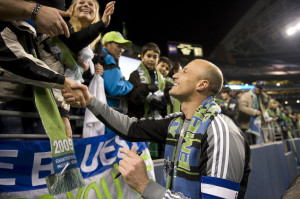
Keller thanks fans after the Sounders 3 – 0 win over New York in their first ever MLS game.
(photo: Rod Mar)
KELLER SPENT the fall of 2008 and the winter of 2009 establishing himself as the Sounders new leader and making good on his pledge to establish a “right way” to do things in training, in the changing room, and in the community. This was all good, but it would only go so far if Keller couldn’t play. He was in the middle of the longest layoff of his career, a nearly 10-month stretch that would come to an end with the start of the MLS season in March. It would be reasonable to have doubts about his play, but Sigi Schmid had none.
Schmid had first worked as a coach with Keller after the Youth World Cup in 1989 and immediately was able to learn something about how goalkeepers should train. At UCLA Schmid worked his goalkeepers with what’s known as pressure training. The idea is to fire as many shots as possible at a keeper as fast as you can to fine-tune his skills while also working on his fitness.
“Keller wasn’t into that,” Schmid recalls. “He was very meticulous in his training and he wanted things done in a certain way. He wanted to make every save clean and finish every save. I had to adjust to him a little bit, so I actually learned from Kasey that the proper training is somewhere in the middle. Work on your fitness then work on your saves. Make it two separate things.”
Now, almost 20 years later, Schmid didn’t need much evidence to convince him Keller was still at the top of his game. “Once I saw him train I had no worries about his age,” he says. “Sometimes goalkeepers’ best ages are from 30 to 35, because now they’ve got positioning down they’ve still got the physical skills.”
Actually, by the time opening night rolled around his starting keeper would be 39 years old, but Schmid could lean on his new goalkeeper coach Tom Dutra, who had known Keller since they were kids and had trained him during some of his European off seasons.
“I had a responsibility to Kasey,” Dutra says, “to make sure this worked. There was a fear that he was too old, but he was fantastic from the get-go. He said he wanted to do things the right way and he trained as hard as he could. He set a fantastic example.”

